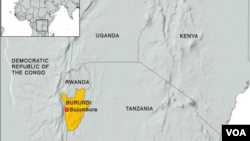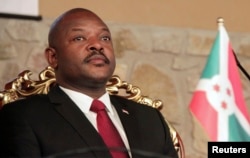A delegation of Burundi government ministers is meeting Saturday with Burundi refugees who have sought safe haven in neighboring Rwanda, according to VOA's Africa Division. The refugees say they have left their homes in Burundi because they are afraid of the violence that could erupt in the run up to Burundi's presidential elections in June.
There is concern in Burundi that President Pierre Nkurunziza's ambitions for a constitutionally-questionable third term in office could re-ignite violence in a country still regaining its footing after years of civil war.
President Nkurunziza has faced revolt from within his own party over his presumed candidacy. Seventy-nine members of the ruling CNDD-FDD party wrote the president last week asking him not to seek office.
The influential Catholic Church in Burundi also has joined the growing chorus of civil society and opposition groups urging Mr. Nkurunziza not to run.
The president has offered no signal he will step aside.
Nkurunziza's eligibility comes down to a legal argument over the wording of a formative peace agreement and the country's constitution.
Burundi's existing political structures were founded on the 2000 Arusha agreement which brought to an end the civil war between Hutu and Tutsi factions that killed up to 300,000 people. That agreement says the president can serve no more than two terms in office.
But the 2005 constitution states the president must be elected through “universal direct suffrage” - interpreted to mean a popular vote. Nkurunziza was elected by parliament to his first term, so, his supporters argue, he is eligible to run again.
Whether he does so or not, Nkurunziza's government has been under fire from rights groups and the international community for excluding the opposition and silencing voices of dissent.
Rights groups have accused the ruling party of arming its youth wing, known as the Imbonerakure, and using them to attack opponents in the past.
Human Rights Watch last month said members of the group assisted the police and military in executing 47 people following a confrontation with an unnamed armed group in northwestern Cibitoke province.
Jean Claude Nkundwa, a peace activist in Bujumbura, fears that armed groups could be exploited to keep the president in power.
The international community, including the United Nations, the United States and the African Union have urged Burundian political actors to respect the rule of law and hold fair elections, without much weighing into the debate about whether the president has the legal authority to run.
Nkundwa is urging foreign partners to be prepared to intervene if necessary.
“The current situation may just break all the things that we have built for 10 years,” he says. “This is where I actually personally would call the international community to get actively engaged to protect this democratic state we have achieved.”






